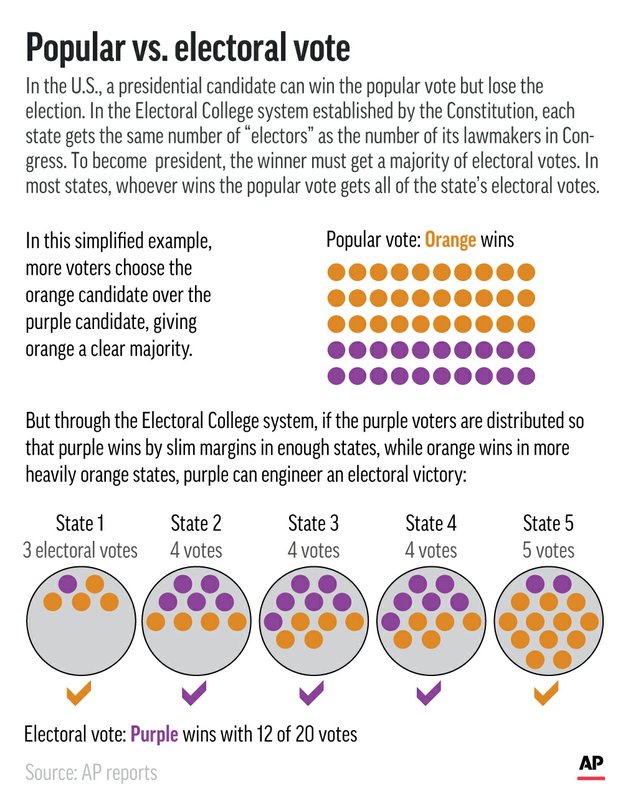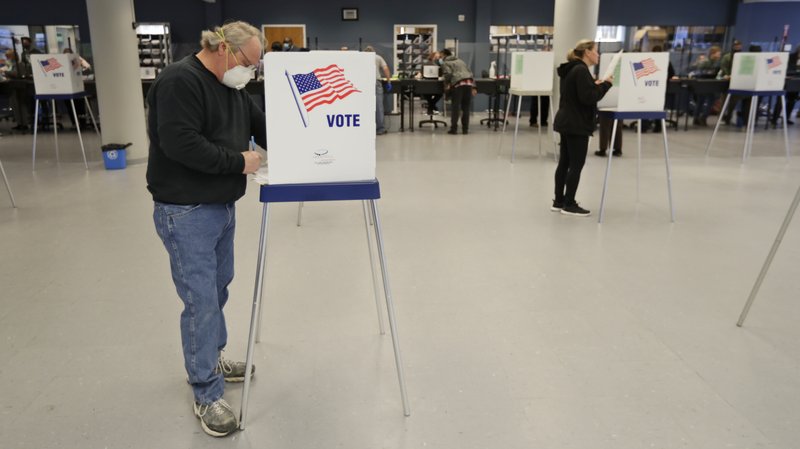Election Question: Why is it that one candidate can win the popular vote but another wins the electoral vote and thus the presidency?
Answer: That’s how the framers of the Constitution set it up.
This unique system of electing presidents is a big reason why Donald Trump won the presidency in 2016. Four candidates in history have won a majority of the popular vote only to be denied the presidency by the Electoral College.
The Electoral College was devised at the Constitutional Convention in 1787. It was a compromise between those who wanted direct popular elections for president and those who preferred to have Congress decide. At a time of little national identity and competition among the states, there were concerns that people would favor their regional candidates and that big states with denser populations would dominate the vote.

The Electoral College has 538 members, with the number allocated to each state based on how many representatives it has in the House plus its two senators. (The District of Columbia gets three, despite the fact that the home to Congress has no vote in Congress.)
To be elected president, the winner must get at least half plus one — or 270 electoral votes.
This hybrid system means that more weight is given to a single vote in a small state than the vote of someone in a large state, leading to outcomes at times that have been at odds with the popular vote.
In fact, part of a presidential candidate’s campaign strategy is drawing a map of states the candidate can and must win to gather 270 electoral votes.
In 2016, for instance, Democrat Hillary Clinton received nearly 2.9 million more votes than Trump in the presidential election, after racking up more lopsided wins in big states like New York and California. But she lost the presidency due to Trump’s winning margin in the Electoral College, which came after he pulled out narrow victories in less populated Midwestern states like Michigan and Wisconsin.
It would take a constitutional amendment to abolish the Electoral College — an unlikely move because of how difficult it is to pass and ratify constitutional changes. But there’s a separate movement that calls for a compact of states to allocate all their electoral votes to the national popular vote winner, regardless of how those individual states opted in an election. That still faces an uphill climb, though.
(AP)












4 Responses
If they would ever abolish the electoral college a republican would never win, the states of New York California and Illinois would be the only votes that matter. This would lead to the ultimate taxation without representation and the other 47 states would literally secede and it would be the United States of New York California and Illinois which honestly speaking might not be the worst thing if they were no longer part of our country.
The electoral college is necessary since the United States is a federation of states. It requires candidates to seek support from the entire country, not one state or region. Without federalism, the United States would probably split into at four separate countries (Northeast, West, South, Midwest),
The Democrats risk losing the electoral vote since instead of appealing from people in what they refer to as the “fly over zone” whose inhabitants they consider to be “deplorables”, they prefer to “preach to choir” along the coasts and run up high totals of popular votes where they don’t make a difference.
The electoral college means that no matter how many fraudulent votes the Democrats manufacture in California or New York it won’t affect the result. That means they have to concentrate their fraud in places like Philadelphia or Miami-Dade and Broward, where they control the local area but not the state. This doesn’t stop them, but it limits the damage they can do. If the popular vote mattered then all they would have to do is make up a few million more votes in their states and they could win every time.
This is why democracy is bad. As others have pointed out, you’ll just be cramming down the will of 51% of the population forever, essentially taking away agency from everyone else, forever.